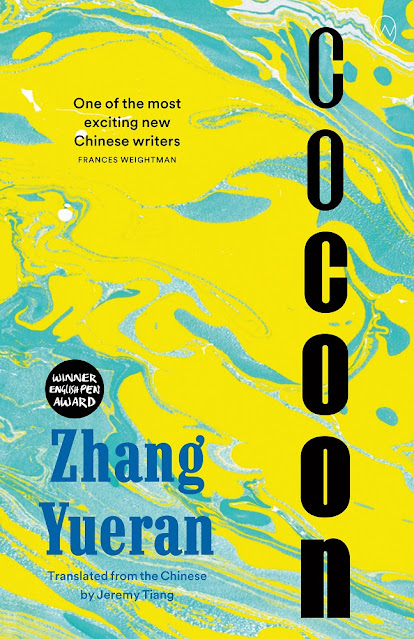Cocoon
by Zhang Yueran
translated by Jeremy Tiang
“Cocoon” by Zhang Yueran is a complex, lyrical and thoughtful novel – an exploration of the theme of memory and time, set against the backdrop of the recent history of China, particularly the Cultural Revolution.
The novel’s narrative is bookended by a frame
story set in the present. Li Jiaqi returns to the town where she was brought up. Her ailing grandfather Li Jisheng is dying,
and although he is uncommunicative, she spends his last days with him. Li Jisheng
is a mysterious figure – a widely-respected doctor and part of the “establishment”,
his past harbours unsavoury mysteries which led to a long-running rift between
him and his son Li Muyuan, Li Jiaqi’s father. Jiaqi is obsessed with her family history, and
particularly that of her professor father, who abandoned his wife and calling
to reinvent himself as a businessman in Beijing. Jiaqi’s return to her roots is, in many
respects, the final station on a long journey of (self) discovery. To conclude her investigation, she seeks out
Cheng Gong, a childhood friend. These
two characters – and their respective families – are connected by a dark thread
involving a macabre crime which happened way back in 1967. The main part of the book is divided in segments
alternating between the respective narratives of Li Jiaqi and Cheng Gong, both
recounted in the first person.
This novel has a strange aura to it, a beguiling mixture of bleakness and nostalgia rendered in poetic prose. It presents an array of broken characters, a panorama of generations marked by cultural upheavals. Yet, it never feels cynical or nihilistic, and, against all odds, it conveys a sturdy belief in the redeeming aspects of friendship and love.
A word of warning though – “Cocoon” is
touted as a “literary thriller”, but is more “literary” than “thriller”. This is
one of those works which puts you immediately in the middle of things, and
expects you to make the effort to piece together the clues and information provided.
Indeed, it was only after the half-way mark that the parts of the puzzle
started falling into place. Also, I felt
that the storylines of the different families were (presumably purposely) so
similar, that at times I had some difficulty distinguishing between the various
strands of the plot. The final credits
section says that Jeremy Tiang’s masterful translation has been “slightly
abridged from the original, in agreement with the author”. I wonder whether the longer version would
have made it any easier to follow. In
any case, this was an intriguing and poignant novel.








No comments:
Post a Comment